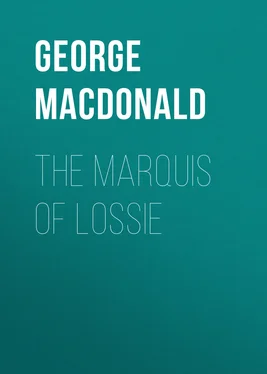George MacDonald - The Marquis of Lossie
Здесь есть возможность читать онлайн «George MacDonald - The Marquis of Lossie» — ознакомительный отрывок электронной книги совершенно бесплатно, а после прочтения отрывка купить полную версию. В некоторых случаях можно слушать аудио, скачать через торрент в формате fb2 и присутствует краткое содержание. Жанр: foreign_prose, foreign_religion, foreign_antique, на английском языке. Описание произведения, (предисловие) а так же отзывы посетителей доступны на портале библиотеки ЛибКат.
- Название:The Marquis of Lossie
- Автор:
- Жанр:
- Год:неизвестен
- ISBN:нет данных
- Рейтинг книги:3 / 5. Голосов: 1
-
Избранное:Добавить в избранное
- Отзывы:
-
Ваша оценка:
- 60
- 1
- 2
- 3
- 4
- 5
The Marquis of Lossie: краткое содержание, описание и аннотация
Предлагаем к чтению аннотацию, описание, краткое содержание или предисловие (зависит от того, что написал сам автор книги «The Marquis of Lossie»). Если вы не нашли необходимую информацию о книге — напишите в комментариях, мы постараемся отыскать её.
The Marquis of Lossie — читать онлайн ознакомительный отрывок
Ниже представлен текст книги, разбитый по страницам. Система сохранения места последней прочитанной страницы, позволяет с удобством читать онлайн бесплатно книгу «The Marquis of Lossie», без необходимости каждый раз заново искать на чём Вы остановились. Поставьте закладку, и сможете в любой момент перейти на страницу, на которой закончили чтение.
Интервал:
Закладка:
"I hope you don't mean to imply, sir, that I don't know my business," returned Malcolm, laughing.
"Anything but that! It were nearer the thing to say, that for all I know you may understand mine as well."
"I wish I did, sir. Except the pictures at Lossie House and those in Portland Place, I've never seen one in my life. About most of them I must say I find it hard to imagine what better the world is for them. Mr Graham says that no work that doesn't tend to make the world better makes it richer. If he were a heathen, he says, he would build a temple to Ses, the sister of Psyche."
"Ses? – I don't remember her," said Lenorme.
"The moth, sir; – 'the moth and the rust,' you know."
"Yes, yes; now I know! Capital! Only more things may tend to make the world better than some people think. – Who is this Mr Graham of yours? He must be no common man."
"You are right there, sir; there is not another like him in the whole world, I believe."
And thereupon Malcolm set himself to give the painter an idea of the schoolmaster.
When they had talked about him for a little while,
"Well, all this accounts for your being a scholar," said Lenorme; "but –"
"I am little enough of that, sir," interrupted Malcolm. "Any Scotch boy that likes to learn finds the way open to him."
"I am aware of that. But were you really reading Epictetus when we left you in the park this morning?"
"Yes, sir: why not?"
"In the original?"
"Yes, sir; but not very readily. I am a poor Greek scholar. But my copy has a rough Latin translation on the opposite page, and that helps me out. It's not difficult. You would think nothing of it if it had been Cornelius Nepos, or Cordery's Colloquies. It's only a better, not a more difficult book."
"I don't know about that. It's not every one who can read Greek that can understand Epictetus. Tell me what you have learned from him?"
"That would be hard to do. A man is very ready to forget how he came first to think of the things he loves best. You see they are as much a necessity of your being as they are of the man's who thought them first. I can no more do without the truth than Plato. It is as much my needful food and as fully mine to possess as his. His having it, Mr Graham says, was for my sake as well as his own. – It's just like what Sir Thomas Browne says about the faces of those we love – that we cannot retain the idea of them because they are ourselves. Those that help the world must be served like their master and a good deal forgotten, I fancy. Of course they don't mind it. – I remember another passage I think says something to the same purpose – one in Epictetus himself," continued Malcolm, drawing the little book from his pocket and turning over the leaves, while Lenorme sat waiting, wondering, and careful not to interrupt him.
He turned to the forty-second chapter, and began to read from the Greek.
"I've forgotten all the Greek I ever had," said Lenorme.
Then Malcolm turned to the opposite page and began to read the Latin.
"Tut! tut!" said Lenorme, "I can't follow your Scotch pronunciation."
"That's a pity," said Malcolm: "it's the right way."
"I don't doubt it. You Scotch are always in the right! But just read it off in English – will you?"
Thus adjured, Malcolm read slowly and with choice of word and phrase
"'And if any one shall say unto thee, that thou knowest nothing, notwithstanding thou must not be vexed: then know thou that thou hast begun thy work.' – That is," explained Malcolm, "when you keep silence about principles in the presence of those that are incapable of understanding them. – 'For the sheep also do not manifest to the shepherds how much they have eaten, by producing fodder; but, inwardly digesting their food, they produce outwardly wool and milk. And thou therefore set not forth principles before the unthinking, but the actions that result from the digestion of them.' – That last is not quite literal, but I think it's about right," concluded Malcolm, putting the book again in the breast pocket of his silver buttoned coat. "– That's the passage I thought of, but I see now it won't apply. He speaks of not saying what you know; I spoke of forgetting where you got it."
"Come now," said Lenorme, growing more and more interested in his new acquaintance, "tell me something about your life. Account for yourself. – If you will make a friendship of it, you must do that."
"I will, sir," said Malcolm, and with the word began to tell him most things he could think of as bearing upon his mental history up to and after the time also when his birth was disclosed to him. In omitting that disclosure he believed he had without it quite accounted for himself. Through the whole recital he dwelt chiefly on the lessons and influences of the schoolmaster.
"Well, I must admit," said Lenorme when he had ended, "that you are no longer unintelligible, not to say incredible. You have had a splendid education, in which I hope you give the herring and Kelpie their due share."
He sat silently regarding him for a few moments. Then he said:
"I'll tell you what now: if I help you to buy a horse, you must help me to paint a picture."
"I don't know how I'm to do that," said Malcolm, "but if you do, that's enough. I shall only be too happy to do what I can."
"Then I'll tell you. – But you're not to tell anybody: it's a secret. – I have discovered that there is no suitable portrait of Lady Lossie's father. It is a great pity. His brother and his father and grandfather are all in Portland Place, in Highland costume, as chiefs of their clan; his place only is vacant. Lady Lossie, however, has in her possession one or two miniatures of him, which, although badly painted, I should think may give the outlines of his face and head with tolerable correctness. From the portraits of his predecessors, and from Lady Lossie herself, I gain some knowledge of what is common to the family; and from all together I hope to gather and paint what will be recognizable by her as a likeness of her father – which afterwards I hope to better by her remarks. These remarks I hope to get first from her feelings unadulterated by criticism, through the surprise of coming upon the picture suddenly; afterwards from her judgment at its leisure. Now I remember seeing you wait at table – the first time I saw you – in the Highland dress: will you come to me so dressed, and let me paint from you?"
"I'll do better than that, sir," cried Malcolm, eagerly. "I'll get up from Lossie Home my lord's very dress that he wore when he went to court – his jewelled dirk, and Andrew Ferrara broadsword with the hilt of real silver. That'll greatly help your design upon my lady, for he dressed up in them all more than once just to please her."
"Thank you," said Lenorme very heartily; "that will be of immense advantage. Write at once."
"I will, sir. – Only I'm a bigger man than my – late master, and you must mind that."
"I'll see to it. You get the clothes, and all the rest of the accoutrements – rich with barbaric gems and gold, and"
"Neither gems nor gold, sir; – honest Scotch cairngorms and plain silver," said Malcolm.
"I only quoted Milton," returned Lenorme.
"Then you should have quoted correctly, sir. – 'Showers on her kings barbaric pearl and gold,' – that's the line, and you can't better it. Mr Graham always pulled me up if I didn't quote correctly. – By the bye, sir, some say it's kings barbaric, but there's barbaric gold in Virgil."
"I dare say you are right," said Lenorme. "But you're far too learned for me."
"Don't make game of me, sir. I know two or three books pretty well, and when I get a chance I can't help talking about them. It's so seldom now I can get a mouthful of Milton. There's no cave here to go into, and roll the mimic thunder in your mouth. If the people here heard me reading loud out, they would call me mad. It's a mercy in this London, if a working man get loneliness enough to say his prayers in!"
Читать дальшеИнтервал:
Закладка:
Похожие книги на «The Marquis of Lossie»
Представляем Вашему вниманию похожие книги на «The Marquis of Lossie» списком для выбора. Мы отобрали схожую по названию и смыслу литературу в надежде предоставить читателям больше вариантов отыскать новые, интересные, ещё непрочитанные произведения.
Обсуждение, отзывы о книге «The Marquis of Lossie» и просто собственные мнения читателей. Оставьте ваши комментарии, напишите, что Вы думаете о произведении, его смысле или главных героях. Укажите что конкретно понравилось, а что нет, и почему Вы так считаете.












